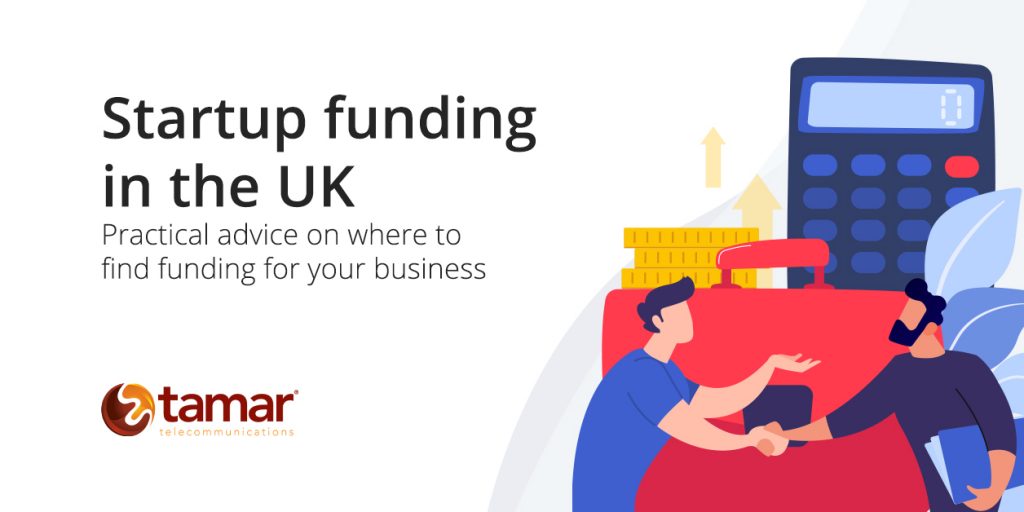This article gives practical advice on where to find startup funding in the UK. If you’re a startup founder and you are looking for options to fund your business through its launch or early growth, you’ve come to the right place.

Putting together a funding mix
It’s good practice to secure the funding for a startup from multiple sources, creating a ‘funding mix’.
This approach can help businesses avoid putting too much pressure on any one funding source, and it also serves as a useful reminder to investigate relatively low-risk funding sources such as grants and crowdfunding, alongside more traditional sources such as business loans and investment.
Some businesses with simple funding requirements may prefer to get their funding from a single source, but as a general rule, you should be looking to combine a few of the funding sources discussed in this article.
Start-up loans
Government-backed start-up loans are among the best-suited types of business loan for startups.
With a start-up loan, you can borrow from £500 to £25,000 to help start your business, with a fixed interest rate of 6%. These loans are available to UK businesses in their first 24 months of trading. Start-up loans are made out to the founder rather than the business itself, so you’ll be personally responsible for repayments.
Full information is available via The Start Up Loans Company.
Grants
It’s always worth investigating whether there’s a grant you could apply for to help fund your startup.
First off, take a look at this list of over 150 grants for small businesses, compiled by Entrepreneur Handbook. As you’ll see, the grants tend to have certain eligibility requirements, such as the age or gender of the founder, the type of business, or more specific criteria such as a willingness to trade with certain countries. Think about your own attributes and the nature of your startup, then search for types of grant which may apply.
Grants are an especially pertinent funding source for cause-related start-ups, such as those which involve community development, eco-friendly innovation, education and the promotion of good causes.
Crowdfunding
Over the last decade-or-so, crowdfunding has evolved from a little-known fundraising tactic to a key source of funding for any startup to consider.
In a crowdfunding campaign, a person or organisation asks people to pledge funding towards their project, usually in exchange for a reward. The organiser sets a funding goal, then asks for contributions via the crowdfunding platform and their own marketing channels. The goal must be reached by the end of a set time period, in order for the founder to be able to secure all the backers’ contributions. This setup ensures the funds are only released if the organiser is sure to receive all the funding they say they need.
All kinds of startups fund their projects by crowdfunding via platforms such as Kickstarter and Indiegogo. Whether you’re a street food startup looking to fund new premises, an inventor wanting to progress from prototyping to production, a publisher who wants to start printing a new magazine, or just about any other type of startup founder, there is potential to source a significant chunk of your startup funding through crowdfunding.

Selling equity
Many startup founders sell equity in their business in return for funding. This means an investor pays the founder for a certain percentage of the business, in the expectation of making a good return on their investment by selling their equity after the business has grown.
Forbes contributor Alejandro Cremades identifies the following types of investor for small businesses to look into:
● Friends and family
● Banks and government agencies
● Angel investors
● Angel groups
● Accelerators and incubators
● Family offices
● Venture capital firms
● Corporate investors
Selling equity is an especially popular funding option for tech-related startups, which often seek funding from venture capitalists, also known as ‘VCs’. In the view of Harvard Business School professor Tom Nicholas, the earliest venture capitalists were the rich investors who backed whaling missions departing from New England in the mid-19th Century, who risked their money in the knowledge there was only a slim chance of the venture proving profitable.
These early venture capitalists knew two things: first, that most of their investments probably wouldn’t pay off; and second, that the few ventures that did succeed could bring big financial rewards. The same is true of today’s startup-focused VCs. They understand that many startups fail, but they are holding out hope that one of the startups in their portfolio could be the next Facebook, Uber or Airbnb. If you’re seeking investment for your startup from a VC, having the ability to paint them a picture of high potential rewards will be crucial.
Personal or family finance
While it’s clear that not everyone has the same level of personal finance to put into a business, it is usual practice for founders to invest a considerable amount of their own money, or at least a considerable share of their disposable income, in their own startup. How much to invest is a matter of personal choice. Some founders go so far as to sell personal assets or remortgage a property in order to raise funds for their business.
Not only does investing in one’s own startup directly benefit the business’s finances; it also sends a good signal to investors, who will likely be looking for signals of the founder’s commitment to the venture. Conversely, a failure to invest any personal funds could be taken as a negative signal
It goes without saying that investing personally in a startup should be done with careful consideration to your existing living expenses and financial commitments.
Advice for when your startup is fully funded
Now you have several ways to get startup funding in the UK. Once you’ve sourced all the funding your startup needs, the time comes to make sure that money is spent wisely. For actionable tips on the investments new businesses need to make, from creating high-quality branding to setting up a business telephone number, see this guide on 7 easy ways to start marketing your business.







